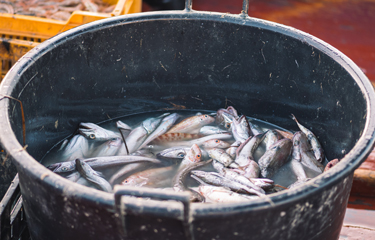The Aquatic Life Institute (ALI) is calling for an animal welfare-based approach to be adopted by the global fishing industry.
Founded in 2019, the New York City, U.S.A.-based organization “advocate[s] for high aquatic animal welfare among key decision-makers that influence how aquatic animals are utilized and how their welfare is defined and governed.”
On Wednesday, 9 March, ALI released a new report, “Key Welfare Recommendations for Marine Capture Fisheries,” calling for the welfare of marine animals to be better addressed by the fishing industry. The report is intended for use by fisheries management practitioners, fishing industry actors, and global certification bodies to learn more about the issue and how a welfare-based approach can be adopted by individual companies and fisheries management bodies.
“Welfare in capture fisheries is a completely new concept, even among dedicated fisheries management professionals. However, we have a moral and in many cases, legal obligation, to look after these animals as we do for land animals,” Aquatic Life Institute Head of Strategic Partnerships Christine Xu, one of the report’s authors, said in a press release. “It is also in the interest of the fishing sector itself to minimize the suffering inflicted on aquatic animals as much as possible, given the growing consumer awareness around animal welfare and the fact that the long-term viability of the fisheries sector depends on healthy fish populations.”
The fishing industry is the last food-producing sector that does not take animal welfare into consideration, even when, according to ALI, about two to three trillion aquatic animals are caught at sea annually, about 35 times more than the number of land animals killed for food every year. Most capture fisheries currently have no requirements for animal welfare, with some exceptions for fisheries holding some sustainability certifications, ALI said.
Welfare issues experienced in capture fisheries include injury, exhaustion, thermal shock, barometric trauma, mutilation, and death by asphyxiation. The report has identified five priority areas where poor animal-welfare issues are significant: the capture and retrieval, onboard handling, stunning and slaughter, and incidental catch of non-target species (bycatch), and abandoned fishing gear.
This animal welfare-based approach for capture fisheries involves consideration of animal welfare and the potential impacts of fishing activities on welfare when creating fisheries-management policies, retrofitting fishing vessels, and designing new fishing technology. Recommendations from the report include actions such as reducing the duration of capture, use of stun equipment before slaughter, prohibition of removal or intentional damage of animal body parts, and required reporting of lost fishing gear, among others. The authors of the report acknowledge the existence a large scientific knowledge gap around how to achieve good animal welfare in capture fisheries.
“More research and financial support by all relevant stakeholders is needed, including developing ‘welfare-minded’ fishing gear, refining current fishing durations and speeds, scaling up humane stunning and slaughter onboard, and limiting the indirect effects of fishing on non-target animals,” ALI Scientific Resarcher and report co-author Wasseem Emam said.
Emam said ALI hopes more global eco-labeling schemes will eventually require higher welfare standards in their sustainable fisheries certifications. Upcoming revisions of standards, including the Marine Stewardship Council and the Global Seafood Alliance’s Best Seafood Practices, present an opportunity to improve animal welfare in capture fisheries, he said.
“While we recognize that knowledge gaps exist, our report lists various actionable steps that can already be taken. Furthermore, we showcase several examples of existing good welfare practices in the fishing industry, so we know that it can be done,” Emam said.
Photo courtesy of Michele Ursi/Shutterstock







